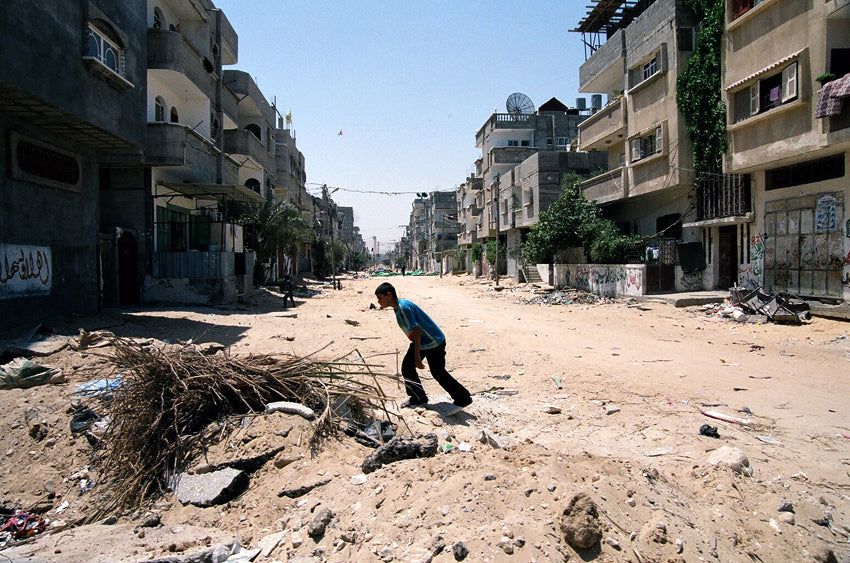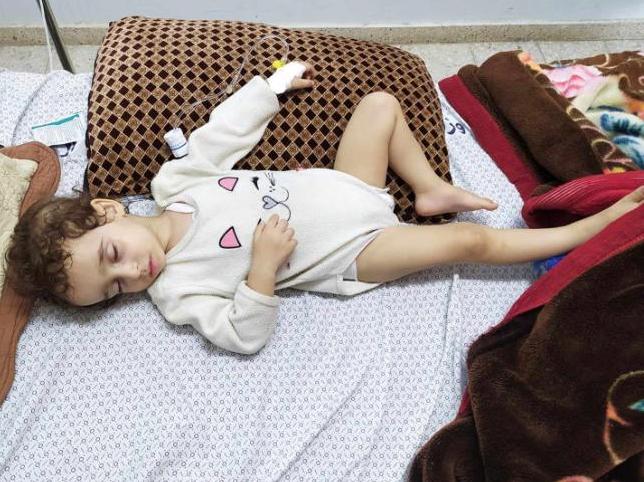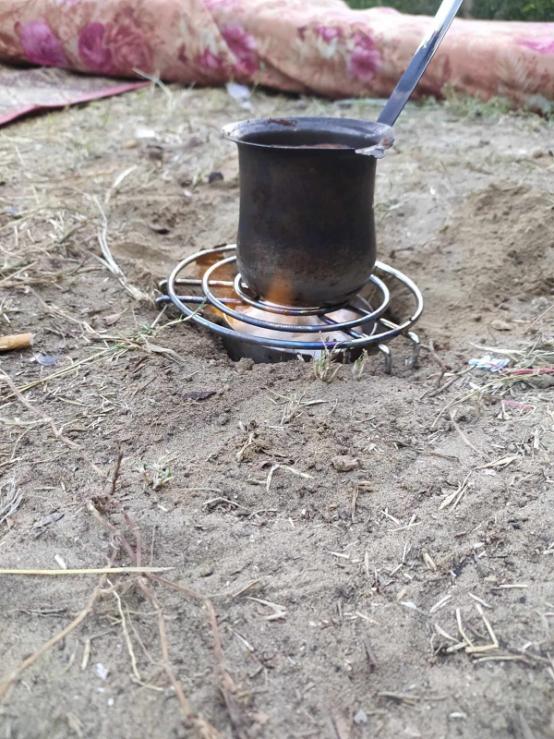A family’s fight for survival in Rafah
A family moves from home to a friend’s house, to a hospital, and back home again—but doesn’t feel safe anywhere.

On the early morning of Oct. 7, 2023, Hanadi Abu Lebda, 32, woke to the jarring sound of rockets and her children’s terrified screams. “The heavy bombings grew louder with each passing second,” she recalls. Her 2-year-old daughter, Ghena, cried incessantly. Hanadi tried to comfort Ghena while searching frantically for her other daughters, Salma, 9, and Sali, 6. She found Salma darting around the house in fear and Sali huddled in a corner, sobbing.
Hanadi’s husband, Hussien Attallah, who works as a loan officer for UNRWA, returned home amidst the chaos. “This is the start of a massive and prolonged aggression,” he grimly stated.
Hanadi and Hussien reside with their family in Rafah’s Yebna camp. The two young people have lived through several aggressions — 2008, 2011, 2014, and 2021— but the one that commenced on Oct. 7, 2023, marked the most devastating by far that they have ever experienced.
Within the initial days of the attack, the household ran out of food and drinking water. Hussien left the house in search of sustenance, while Hanadi and her children sought refuge in the house’s hall, where they nestled amidst sofas and a concrete column — the safest spot in case of an attack on their home or neighboring houses.
Israel soon cut off electricity and fuel supplies to Gaza. During the resulting blackout, Hanadi used her mobile phone as a flashlight to comfort her children at night and as a news source to stay informed via the radio.
On Oct. 11, after a grueling search for food and water, Hussien returned home with only two bottles of drinking water and one can of beans. Collapsing onto the sofa, he expressed uncertainty about their safety in Yebna camp. Hanadi recalls that the family then “spent hours packing our emergency bags, questioning where we could find refuge.”
The family eventually sought shelter at their friend Abu Karim’s house, a 30-minute walk from their home. Upon arrival, Abu Karim’s children joyfully welcomed them into the house. Inside, Salma anxiously inquired of Abu Karim’s wife, “Is this a safe place?” While the adults attempted to reassure the children, the women prepared dinner, which was reminiscent of pre-aggression times when gas was used for cooking.
The dinner table, adorned with plates of molokhiya, salad, and a roasted rooster, offered a respite from the turmoil — until a loud sound shook the house and part of the ceiling collapsed. Chaos ensued, filling the house with smoke and debris. Amidst the darkness, Hanadi struggled to locate her daughters.
The neighboring house had been targeted, prompting Abu Karim and Hussien to embark on rescue operations. In the chaos of the neighboring house’s ruins, a wall collapsed and injured Hussien’s leg.
Seeking safer refuge and medical attention for Hussien, Hanadi and her family made their way to the Gaza European Hospital, between Rafah and Khan Younis. In the morning, Hanadi walked through the hospital as Hussien rested in the men’s surgery ward. She encountered the grim reality of the hospital: innumerable wounded Palestinians were either being treated or waiting for treatment, and many ambulances carried in more people.
 Two-year-old Ghena fell ill during the family’s time sheltering at the Gaza European Hospital. Photo: Hussien AtaAllah
Two-year-old Ghena fell ill during the family’s time sheltering at the Gaza European Hospital. Photo: Hussien AtaAllah
Later, gathered in the hospital garden among countless other wounded and displaced people, Hanadi and Hussien improvised a meal featuring bread Hussien had procured from the nurses’ room.
In the weeks that followed, the family’s life at the hospital was characterized by cold, hunger, overcrowding, and the distressing sight of so many severely wounded individuals. For children like Salma and Sali, witnessing such scenes can have a lasting impact, with potentially adverse effects on their future well-being. Moreover, the lack of shower facilities and the long queues—particularly for the one bathroom serving 50 people—proved exhausting, especially for the children.
During their displacement at the hospital, Hussien and Hanadi resorted to unconventional means to provide warmth and cook food. They utilized a cotton wick soaked in alcohol, igniting it to create a makeshift source of fuel. This improvised method allowed them to brew tea and prepare meals, albeit amidst the challenges of their harrowing circumstances—exacerbated by the toddler Ghena falling ill due to lack of proper nourishment. In the midst of this uncertainty and hardship, Hussien’s and Hanadi’s resourcefulness served as a beacon of resilience. It enabled them to persevere through the darkest of times.
 The family made food and tea by burning cotton soaked in alcohol. Photo: Hussien AtaAllah
The family made food and tea by burning cotton soaked in alcohol. Photo: Hussien AtaAllah
On Feb. 10, overwhelmed by the dire conditions at the hospital, Hussien and Hanadi made the difficult decision to leave and return to their home in Yebna camp, despite the dangers it posed. Hussien’s leg by now was healed, and Ghena had gradually improved. Upon their arrival, their worst fears were realized when, a few days later, they witnessed the bombing of Al Huda Mosque, situated directly adjacent to their house.
This relentless violence left Hussien and Hanadi feeling hopeless, and they began exploring ways to escape Gaza through the Rafah Crossing Point into Egypt. However, they faced a significant obstacle: a lack of funds. Traveling into Egypt through the Rafah Crossing Point — which is currently the only way to leave the Gaza Strip — requires substantial coordination fees that can total up to $10,000 per person. This is the barrier that is now faced by everyone in Gaza who wishes to leave for reasons of safety and survival.
For anyone in Gaza who does not have enough funds to relocate to a safer place, all they can do is wait for the harsh reality of the unknown. Hanadi echoes the feeling of many when she says, “I fear the worst is coming.”
